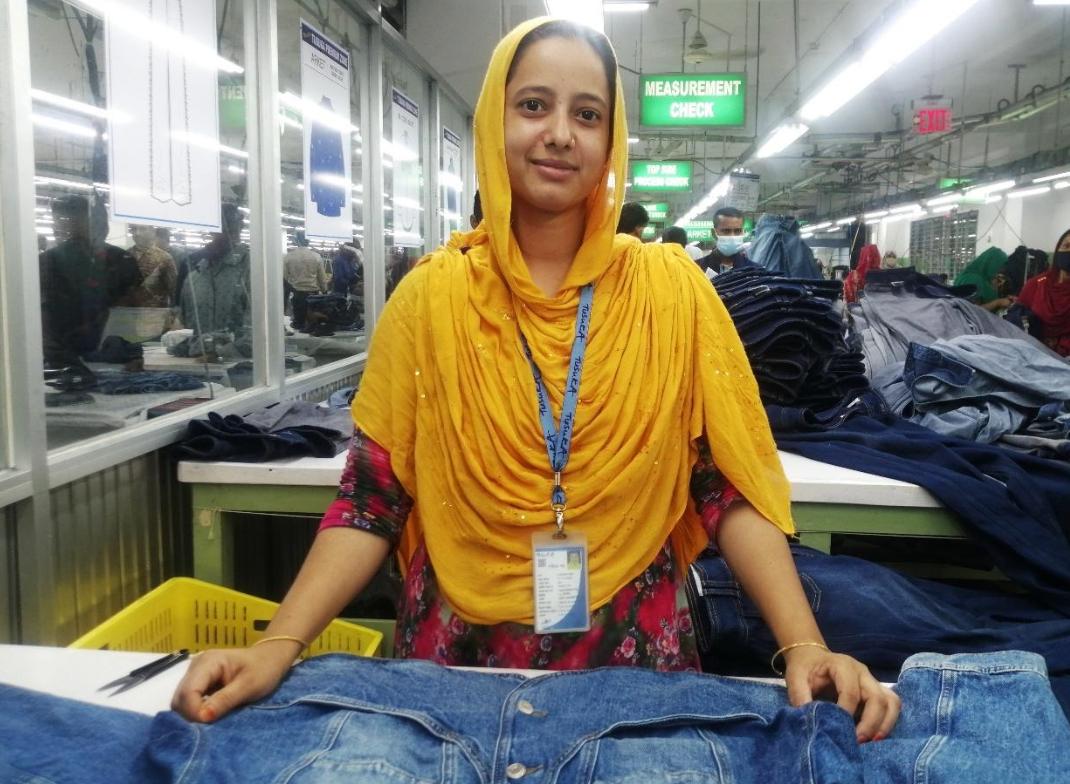
Bangladesh’s RMG sector is facing rapid changes due to automation, digitization, and shifting global trade policies. Women, who make up the majority of the workforce, remain trapped in low-paid, insecure jobs with limited mobility due to weak social protections, entrenched norms, and lack of leadership opportunities. Many factories also fall short of meeting new EU standards. To ensure women benefit from the future of work, a Just Transition approach is needed, centering women’s agency, leadership, and equitable workplace systems.
Through its Oporajita Phase 2 initiative, CARE Bangladesh continues to address these barriers by strengthening women’s agency, leadership, and workplace systems. Phase I demonstrated that women’s voice, confidence, and soft skills improve markedly when factories adopt gender-responsive and inclusive practices. Building on this evidence, Phase 2 applies a Just Transition approach, focusing on women’s empowerment, resilience, and equitable workplace systems to promote the economic empowerment and workplace dignity of women RMG workers.

3,360 women workers completed basic training on career progression.
1,102 women workers completed advanced training on leadership and career growth.
180 women workers completed Futuristic Career Advancement training.
126 women leaders became PSHEA focal persons in 8 factories.
8 factories actively adopted the Gender Equity and Social Inclusion (GESI) toolkit, ranking their practices and integrating gender-responsive policies.
90 % of women garment workers with improved knowledge and agency following participation in Soft Skills development programs
70 % of line supervisors, male colleagues, and staff in the factory demonstrating gender-responsive behavior in daily operations, promoting equity
70 % of factories integrate and demonstrate improved gender equality and social inclusion practices following the rollout of the GESI toolkit

Khodeza Akter, 28, once handed her salary to her husband and never questioned his decisions. After attending Oporajita’s four-day empowerment training in September 2024, she began taking small, decisive steps: saving from her salary, joining financial decisions about their house, and asking for help with chores. At work she now speaks up to supervisors and leads with respect. These changes strengthened family relationships and her confidence. Khodeza says empowerment didn’t require dramatic change; just steady, courageous choices that let her voice be heard.
| Title | Date | File Type | Download Here |
|---|---|---|---|
| Women Lead in Emergencies (WLiE) Roundtable | 4 Jan, 2026 |  Available in PDF Format | Size : 1.76 MB Available in PDF Format | Size : 1.76 MB |
Read and download PDF file |
| Entrepreneurs rising with ambition and growth | 18 Dec, 2024 |  Available in PDF Format | Size : 2.51 MB Available in PDF Format | Size : 2.51 MB |
Read and download PDF file |
| Youth labor market assessment USAID Bijoyee activity | 11 Nov, 2024 |  Available in PDF Format | Size : 6.79 MB Available in PDF Format | Size : 6.79 MB |
Read and download PDF file |
| Policy Brief On Evidence Of Priorities, Nature, & Size Of Government & Donors' Investment In Girls’ Priorities and SDG-5 | 27 Sep, 2023 |  Available in PDF Format | Size : 162.28 KB Available in PDF Format | Size : 162.28 KB |
Read and download PDF file |
| Resource Brief About Theoretical Overview On Social Norms | 22 Dec, 2021 |  Available in PDF Format | Size : 126.32 MB Available in PDF Format | Size : 126.32 MB |
Read and download PDF file |
| The ILO Convention: Opportunity For Change | 26 Jun, 2019 |  Available in PDF Format | Size : 2.86 MB Available in PDF Format | Size : 2.86 MB |
Read and download PDF file |
| Briefing Paper On Ending Violence And Harassment In The World Of Work | 28 May, 2018 |  Available in PDF Format | Size : 144.02 KB Available in PDF Format | Size : 144.02 KB |
Read and download PDF file |
| Situation Analysis On Financial Inclusion For Female RMG Workers | 8 May, 2017 |  Available in PDF Format | Size : 3.96 MB Available in PDF Format | Size : 3.96 MB |
Read and download PDF file |
| CARE Pathways Baseline Summary Report | 23 Oct, 2013 |  Available in PDF Format | Size : 2.62 MB Available in PDF Format | Size : 2.62 MB |
Read and download PDF file |
| An Unprecedented Study Measuring Women's Empowerment | 15 Mar, 2013 |  Available in PDF Format | Size : 3.80 MB Available in PDF Format | Size : 3.80 MB |
Read and download PDF file |
© Copyright 2026 CARE Bangladesh. Powered By Bangladesh Online